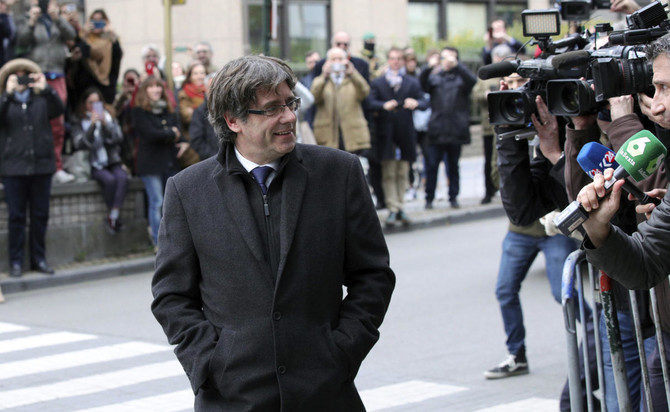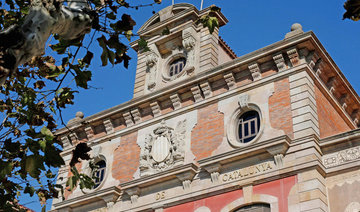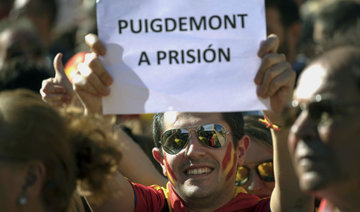BRUSSELS/MADRID: Catalonia’s ousted leader Carles Puigdemont said on Tuesday he accepted the snap election called by Spain’s central government after Madrid took control of the region to block its push for independence.
Puigdemont, speaking at a news conference in Brussels, also said he was not seeking asylum in Belgium after Spain’s state prosecutor recommended charges for rebellion and sedition be brought against him. He would return to Catalonia when given “guarantees” by the Spanish government, he said.
Puigdemont’s announcement that he would accept the regional election on Dec. 21 confirmed that the Madrid government had gained the upper hand in the protracted struggle over Catalonia, for now at least.
Resistance to Madrid’s imposition of direct control on Catalonia failed to materialize at the start of the week and the secessionist leadership is in disarray.
Spain’s Constitutional Court on Tuesday blocked the unilateral declaration of independence made by the regional Parliament on Friday, a move that gained no traction and led to its dismissal less than an hour after it was made.
“I ask the Catalan people to prepare for a long road. Democracy will be the foundation of our victory,” Puigdemont said.
The Spanish government has said Puigdemont was welcome to take his chances and stand in the election, called by Prime Minister Mariano Rajoy as a way to resolve the stand-off.
The political crisis, Spain’s gravest in the four decades since the return of democracy in the late 1970s, was triggered by an independence referendum in Catalonia on Oct. 1.
Though it was declared illegal by Spanish courts and less than half Catalonia’s eligible voters took part, the pro-secessionist regional government said the vote gave it a mandate for independence.
European nations including Britain, Germany and France have backed Rajoy and rejected an independent Catalan state, although some have called for dialogue between the opposing sides.
Meanwhile, the Madrid stock market rallied Tuesday on the fading prospect of Catalan independence, helping other European bourses higher, dealers said. In midsession deals, the Spanish capital’s benchmark IBEX 35 index was up by around 0.7 percent, off earlier highs, having fizzed 2.44-percent higher the previous day.
London and Paris stock markets each posted smaller gains, while Frankfurt was closed for a German public holiday.
“Spanish stocks have enjoyed another leg higher today, with the IBEX 35 hitting its highest level since August as the Catalan independence push has seemingly lost its way,” said analyst David Cheetham at trading firm XTB.
‘Long road’ to independence: Catalan leader accepts new election
‘Long road’ to independence: Catalan leader accepts new election

Drone attack sparks blaze at oil depot in Russia’s Krasnodar, governor says

A Ukrainian drone attack overnight sparked a fire at an oil depot in Russia’s southern region of Krasnodar that has since been extinguished, regional officials said on Wednesday.
A series of drone attacks by Ukraine on Russia’s energy facilities have sparked fires in recent days at a major oil refinery in the Volgograd region, as well as at the Astrakhan gas processing plant.
“The fire in a tank with oil product residues in the village of Novominskaya in the Kanevsky District was fully extinguished,” the region’s operational authorities said on the Telegram messaging app.
Earlier, Veniamin Kondratyev, governor of the Krasnodar region, said that there were no injuries in the fire that was caused by a falling drone debris. A team of 19 people wielding 19 items of equipment were fighting the flames, he said.
Kondratyev did not say which depot was on fire or detail the extent of damage.
The Russian defense ministry said that four Ukrainian drones were destroyed over the Russian territory overnight, but did not mention the Krasnodar region in a statement on the Telegram messaging app.
The ministry only reports drones that its air defense systems destroy, not how many were launched.
There was no immediate comment from Ukraine. Kyiv says that its attacks inside Russia are aimed at destroying infrastructure key to Moscow’s war in Ukraine and are in response to Russian continued bombing of Ukraine.
5 people wounded in shooting at Ohio cosmetics warehouse

- Police say five people have been wounded in a shooting at a cosmetics warehouse in New Albany, Ohio
- A spokesperson for New Albany says victims of Tuesday night’s shooting have been transported to the hospital
NEW ALBANY: Five people were wounded in a shooting Tuesday night at a cosmetics warehouse in Ohio, officials said.
The victims have been transported to the hospital and the suspect is no longer believed to be at the building, said Josh Poland, a spokesperson for the city of New Albany.
The shooting happened at the warehouse for a company that makes products including cosmetics and toiletries. Police did not immediately provide details of the circumstances surrounding the shooting or the conditions of those wounded.
Police were working to evacuate all the employees following the shooting, which happened just before 11 p.m., police said in a statement.
India PM Modi’s party seeks to oust anti-corruption crusader in New Delhi state elections

- Thousands are voting in the Indian capital’s state legislature election, with Prime Minister Narendra Modi’s Hindu nationalist party trying to unseat a powerful regional group that has ruled New Delhi
- Kejriwal’s party won 62 out of 70 seats in the last election in 2020
NEW DELHI: Thousands begin voting in the Indian capital’s state legislature election on Wednesday, with Prime Minister Narendra Modi’s Hindu nationalist party trying to unseat a powerful regional group that has ruled New Delhi for over a decade.
Voters walked to polling booths on a cold, wintry morning to cast their ballots across the sprawling capital. Manish Sisodia, a key Aam Aadmi Party leader, and others offered prayers in a temple before voting.
Modi’s Bharatiya Janata Party is up against the AAP, led by Arvind Kejriwal, which runs New Delhi and has built a vast support base on its welfare policies and an anti-corruption movement. Kejriwal, a popular crusader against corruption, suffered a setback as he himself faced graft allegations.
The AAP won 62 out of 70 seats in a landslide victory in the last election, held in 2020. leaving BJP with only eight and the Congress party with none. The AAP had also swept the 2015 state elections, winning 67 seats, with the BJP taking three.
Modi and Kejriwal have both campaigned vigorously in roadshows with thousands of supporters tailing them. They have offered to revamp government schools and provide free health services and electricity, and a monthly stipend of over 2,000 rupees ($25) to poor women.
Voting ends later Wednesday, with results due on Saturday. More than 15 million people are eligible to vote in New Delhi’s election.
Arati Jerath, a political commentator, predicted a tight contest between the two parties, saying, “Even since the AAP rose to prominence, it has been a one-sided contest.”
Delhi, a city of more than 20 million people, is a federal territory that Modi’s party has not won for over 27 years despite having a sizable support base there.
Kejriwal and other AAP leaders recently faced graft allegations in a liquor license case.
Neerja Chowdhury, a political analyst, said the liquor policy case — in which several AAP leaders, including Kejriwal, went to jail — had dented Kejriwal’s clean image.
Kejriwal was arrested last year along with two key leaders of his party ahead of national elections on charges of receiving bribes from a liquor distributor. They have consistently denied the accusations, saying they are part of a political conspiracy. The Supreme Court allowed the release of Kejriwal and other ministers on bail.
Kejriwal later relinquished the chief minister’s post to his most senior party leader.
The BJP, which failed to secure a majority on its own in last year’s national election but formed the government with coalition partners, has gained some lost ground by winning two state elections in northern Haryana and western Maharashtra states.
Modi’s party hopes to benefit after last week’s federal budget slashed income taxes on the salaried middle class, one of its key voting blocks.
Opposition parties widely condemned Kejriwal’s arrest, accusing Modi’s government of misusing federal investigation agencies to harass and weaken political opponents, and pointed to several raids, arrests and corruption investigations of key opposition figures in the months before the national election.
Kejriwal vowed to be an anti-corruption crusader and formed the AAP in 2012 after tapping into public anger against the then-Congress party government over a series of corruption scandals. His pro-poor policies have focused on fixing state-run schools and providing cheap electricity, free health care and bus transport for women.
The BJP was voted out of power in Delhi in 1998 by the Congress party, which ran the government for 15 years. In the 2015 and 2020 elections in Delhi, the AAP won landslide victories.
Vietnamese man sentenced to 44 years for plotting suicide attack at London’s Heathrow

- He spent a year in Yemen, where he received “military-type” training and helped prepare the group’s magazine, Inspire, working directly with Samir Khan, a US citizen who served as its editor and died in a US drone strike in 2011, according to the departme
LONDON: A Vietnamese man was sentenced to 44 years in prison for attempting to carry out a suicide attack at Heathrow International Airport in London, the US Department of Justice said on Tuesday.
Minh Quang Pham, 41, who was alleged to have traveled to Yemen to receive military training from Al-Qaeda in the Arabian Peninsula, had previously pleaded guilty charges that included providing material support to the group.
US Attorney for the Southern District of New York Danielle R. Sassoon described his actions not only as an affront to the safety of the US “but to the principles of peace and security that we hold dear.”
“Today’s sentencing underscores our collective resolve to stop terrorism before it occurs, and place would-be terrorists in prison,” Sassoon said in a statement.
The Justice Department said Pham traveled from the United Kingdom to Yemen in December 2010 and took an oath of allegiance to the militant group, which the United States lists as a terrorist organization.
He spent a year in Yemen, where he received “military-type” training and helped prepare the group’s magazine, Inspire, working directly with Samir Khan, a US citizen who served as its editor and died in a US drone strike in 2011, according to the department.
Pham was arrested by British authorities in 2011 and extradited to the United States four years later to face terrorism charges, it added.
The Aga Khan, spiritual leader of Ismaili Muslims and a philanthropist, dies at 88

- Over decades, the Aga Khan evolved into a business magnate and a philanthropist, moving between the spiritual and the worldly with ease
PARIS: The Aga Khan, who became the spiritual leader of the world’s millions of Ismaili Muslims at age 20 as a Harvard undergraduate and poured a material empire built on billions of dollars in tithes into building homes, hospitals and schools in developing countries, died Tuesday. He was 88.
His Aga Khan Development Network and the Ismaili religious community announced that His Highness Prince Karim Al-Hussaini, the Aga Khan IV and 49th hereditary imam of the Shia Ismaili Muslims, died in Portugal surrounded by his family.
His successor was designated in his will, which will be read in the presence of his family and religious leaders in Lisbon before the name is made public. A date has not been announced. The successor is chosen from among his male progeny or other relatives, according to the Ismaili community’s website.
Considered by his followers to be a direct descendant of the Prophet Muhammad, His Highness Prince Karim Aga Khan IV was a student when his grandfather passed over his playboy father as his successor to lead the diaspora of Shia Ismaili Muslims, saying his followers should be led by a young man “who has been brought up in the midst of the new age.”
Over decades, the Aga Khan evolved into a business magnate and a philanthropist, moving between the spiritual and the worldly with ease.
While his death was announced late in the day in Europe and the Middle East, ceremonies were already being held Tuesday in Ismaili communities in the US Condolences poured in online from charity groups he supported, as well as the equestrian world, where he was a well-known figure.
“An extraordinarily compassionate global leader,” Canadian Prime Minister Justin Trudeau said Tuesday, calling him a very good friend. “He will be deeply, deeply missed by people around the world.”
Treated as a head of state, the Aga Khan was given the title of “His Highness” by Queen Elizabeth in July 1957, two weeks after his grandfather the Aga Khan III unexpectedly made him heir to the family’s 1,300-year dynasty as leader of the Ismaili Muslim sect.
He became the Aga Khan IV on Oct. 19, 1957, in Dar es Salaam, Tanzania, on the spot where his grandfather once had his weight equaled in diamonds in gifts from his followers.
He had left Harvard to be at his ailing grandfather’s side, and returned to school 18 months later with an entourage and a deep sense of responsibility.
“I was an undergraduate who knew what his work for the rest of his life was going to be,” he said in a 2012 interview with Vanity Fair magazine. “I don’t think anyone in my situation would have been prepared.”
A defender of Islamic culture and values, he was widely regarded as a builder of bridges between Muslim societies and the West despite — or perhaps because of — his reticence to become involved in politics.
The Aga Khan Development Network, his main philanthropic organization, deals mainly with issues of health care, housing, education and rural economic development. It says it works in over 30 countries and has an annual budget of about $1 billion for nonprofit development activities.
A network of hospitals bearing his name are scattered in places where health care had lacked for the poorest, including Bangladesh, Tajikistan and Afghanistan, where he spent tens of millions of dollars for development of local economies.
The extent of the Aga Khan’s financial empire is hard to measure. Some reports estimated his personal wealth to be in the billions.
The Ismailis — a sect originally centered in India but which expanded to large communities in east Africa, Central and South Asia and the Middle East — consider it a duty to tithe up to 12.5 percent of their income to him as steward.
“We have no notion of the accumulation of wealth being evil,” he told Vanity Fair in 2012. “The Islamic ethic is that if God has given you the capacity or good fortune to be a privileged individual in society, you have a moral responsibility to society.”
The Ismaili community’s website said he was born on Dec. 13, 1936, in Creux-de-Genthod, near Geneva, Switzerland, the son of Joan Yarde-Buller and Aly Khan, and spent part of his childhood in Nairobi, Kenya — where a hospital now bears his name.
He became well-known as a horse breeder and owner, and he represented Iran in the 1964 Winter Olympics as a skier. His eye for building and design led him to establish an architecture prize, and programs for Islamic Architecture at MIT and Harvard. He restored ancient Islamic structures throughout the world.
The Aga Khan lived at length in France and had been based in Portugal for the past several years. His development network and foundation are based in Switzerland.
The Aga Khan will be buried in Lisbon. The date was not released.
He is survived by three sons and a daughter and several grandchildren.




















